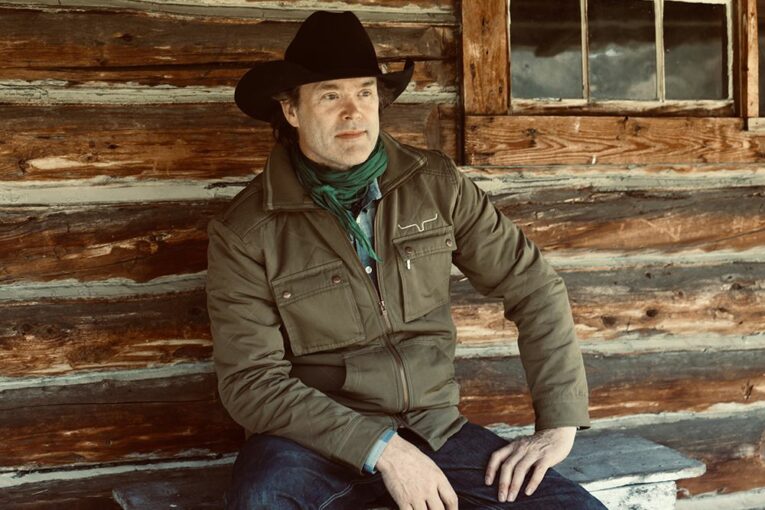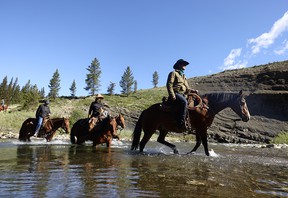
Ordinary Albertans who were part of a grassroots movement — not the UCP government — deserve the credit for halting coal exploration and development in the Rocky Mountains, Corb Lund said Tuesday.
But the Alberta country music star warned in an interview while on tour that the work is far from over when it comes to permanently stopping coal mining in the Rockies.
“This is the goal-line stand,” said the sixth generation Albertan who grew up ranching in the foothills. “If they stick coal mines in the Rockies, it’s going to ruin water for a number of river systems. Potentially, it’s going to blow the tops off of mountains and ranchers are going to lose their places, in some cases. Hunting ground is going to be disturbed, fish are going to be messed up for fishermen and most importantly drinking water across the province could potentially be contaminated. It’s just not worth it.”
Lund is a big reason for the success of the grassroots movement, after the province’s decision to repeal the 1976 coal policy on June 1, 2020, was brought to his attention by ranchers in southwestern Alberta.
He took to Facebook on Jan. 12, 2021, imploring his 125,000 followers to speak out on the threat to the Eastern Slopes. That video has been viewed more than 436,000 times.
His efforts included recruiting several of Alberta’s biggest names in country music — Terri Clark, Brett Kissel, Paul Brandt, Sherryl Sewepagaham, Armond Duck Chief, Katie Rox and Brandi Sidoryk (Nice Horse) — to rework his 2009 single This is my Prairie into a protest song.
Lund said coal mining would have drastic effects in the mountains and downstream with increased selenium levels, effectively poisoning the water supply for producers, communities and wildlife.
He points to the Elk Valley Coal mines on the other side of the Rockies in B.C. as a cautionary tale, as they face increasing pressure from Montana and the U.S. on several issues, including selenium levels and a major fish kill in 2019.
The province’s coal report noted the high level of engagement with the public, which included an online survey that received 25,000 responses — about 90 per cent of which were against future coal projects — while a committee held 67 sessions with more than 70 groups and received an additional 176 letters.
“This is people screaming at the government so loudly that they’ve been forced to do this kicking and screaming every inch of the way,” Lund said. “I’m actually really proud of the people here, because it is a very wide political coalition of people and you don’t see that very much these days.”
On Friday, after having the report for more than two months, the province said all future projects in the Rockies would be halted by ministerial order. One major exception was four mines that were already in the regulatory process: Grassy Mountain, which has been rejected by the AER and is now considering an appeals process, Tent Mountain, Vista (Phase 2) expansion and Mine 14.
-

Alberta reinstates 1976 coal exploration ban on eastern slopes of Rockies
-

Opinion: When no means no in mining Alberta’s treasured Eastern Slopes
Energy Minister Sonya Savage said the ministerial order will remain in place until land-use bylaws could be updated. She said it could take years for the process to be complete.
The announcement does not leave Lund with much confidence.
“In my opinion, when governments make things overly complex, it’s so they can leave themselves loopholes — call me a cynic — but also based on this government’s behaviour around the coal issue from the very beginning, right when they quietly cancelled the coal policy of 1976,” he said.

“In my opinion, they’ve been deceptive and duplicitous and have been trying to fool the Alberta people all the way along. . . . Unless we slam the door on this thing, our water is going to be in jeopardy and the mountains are going to be in jeopardy.”
The singer says his views are not political — he holds no party membership and says he usually steers clear of politics — neither is he anti-development or anti-fossil fuels. But he said harvesting coal from the Eastern Slopes is a “particularly stupid” idea, especially when it involves foreign mine companies doing the work strictly for export.
“It chaps me when . . . some of the people running this deal aren’t even from Alberta,” said Lund. “They come out here, want to ruin the mountains, ruin the water . . . but this is our province, this is our resource, it’s our water.”
The grassroots movement will continue to push for three main points: No new mines, let existing mines continue until they retire and to clean up the mess.
The last point is not just in regards to mines currently in operation. He said the exploration process has caused a lot of damage to the backcountry as companies cut swaths through previously undisturbed forests and environment in search of deposits.
“A whole bunch of coal mining companies went up and made a hell of a mess in the Rockies,” he said.
Twitter: @JoshAldrich03
You can read more of the news on source
